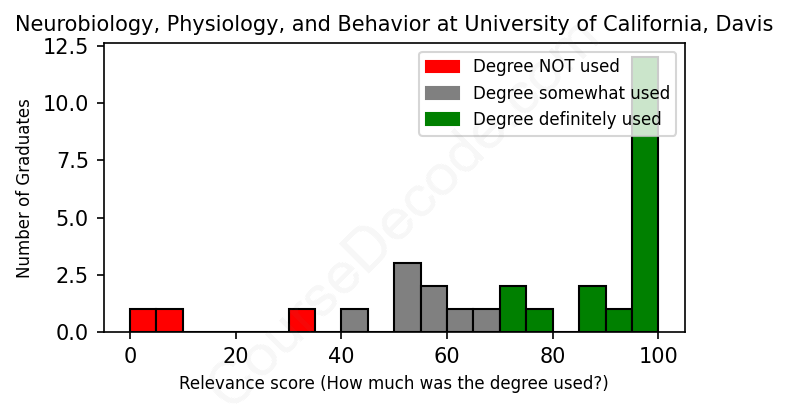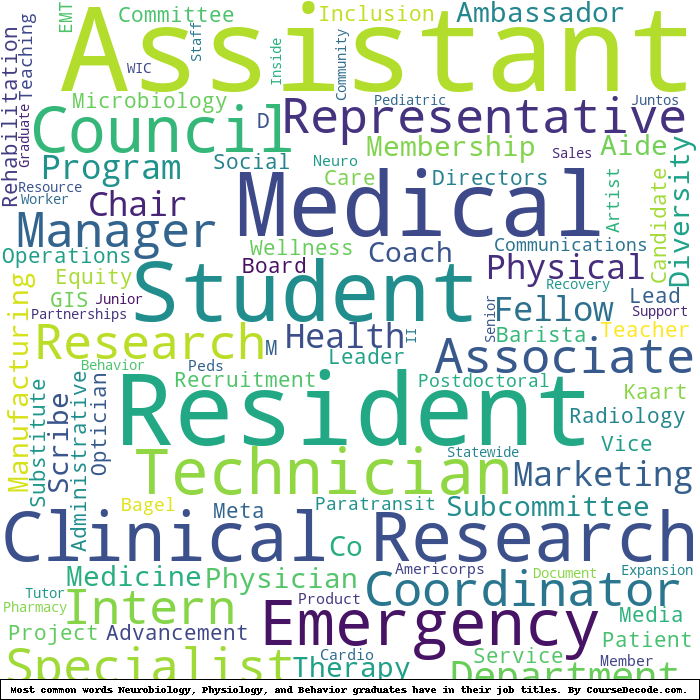
First, some facts. Of the Neurobiology, Physiology, and Behavior graduates from University of California, Davis we've analyzed , here's how many have used (or NOT used) their degree in their career:

These are estimates based on AI analysis of 29 LinkedIn profiles (see below).
The verdict? Slightly above average. Overall, with an average relevance score of 69%, Neurobiology, Physiology, and Behavior graduates from University of California, Davis have a slightly higher likelihood (+2%) of finding work in this field compared to the average graduate across all fields:
And for comparison, here's the chart for all profiles we've looked at across all degrees.
Also, after graduating, 37% of these graduates have pursued further education other than another Bachelor's degree (such as a Masters degree or other), compared to the average across all profiles of 35%. This suggests you may need more than just a Bachelors degree to be competitive as a Neurobiology, Physiology, and Behavior graduate.
See the details:
|
Relevance score: 100% We think this person has gone into a career highly relevant to their degree. We think this person has gone into a career highly relevant to their degree.
DEGREE INFOGraduated in 2021 from University of California, Davis with a Bachelor of Science - BS in Neurobiology, Physiology, and Behavior. No other secondary education since. JOB HISTORY SINCE GRADUATIONPhysical Therapy Aide ASIS Physical Therapy, Inc. Jan 2022 - Present ABOUTCurrently studying Nursing at RUSH University in Chicago. I will graduate in August 2025 with an MSN and be eligible to take the NCLEX and CNL Exams. Prior to this I worked in outpatient care as a Physical Therapy Aide at ASISPhysical Therapy in San Diego CA. While studying Neurobiology, Physiology and Behavior at UC Davis, I was team captain of the schools Division I Field Hockey program where I grew my passion for leadership and collaborating in teams. |
The top 10 most common jobs done by the graduates we've analyzed (ranked most common to least) are:
People who graduated from the University of California, Davis with degrees in Neurobiology, Physiology, and Behavior have ventured into a mixed bag of careers. Many have ended up in roles that are strongly related to their major, particularly in healthcare and research. Positions like Emergency Medicine Resident, Clinical Research Coordinator, and Medical Assistant showcase a solid application of their educational background. These roles typically require an in-depth understanding of physiological and neurological concepts, which directly align with their studies. However, not all paths taken are so closely related. A number of graduates found themselves in jobs like Marketing Manager, Manufacturing Associate, or even positions in customer service that do not actively use their specialized knowledge.
On the whole, while some of these graduates successfully secured positions that leverage their neurobiology and physiology expertise, there's a noticeable trend of graduates opting for jobs that stray from the core content of their degree. Many roles in marketing or administrative tasks seem to draw more from soft skills rather than deep scientific knowledge. It’s a bit of a mixed bag, showcasing that while a degree in Neurobiology, Physiology, and Behavior can open doors to relevant careers, not every job taken fully utilizes the specific skills and knowledge gained during their studies. So, it’s important for students to weigh their career choices and consider how closely they align with their academic background if they want to stay in their field of interest.
Here is a visual representation of the most common words in job titles for Neurobiology, Physiology, and Behavior graduates (this is across all Neurobiology, Physiology, and Behavior graduates we've analyzed, not just those who went to University of California, Davis):

Graduates with a degree in Neurobiology, Physiology, and Behavior from UC Davis seem to have quite varied career trajectories. Right after graduation, many of them typically land entry-level positions in healthcare, pharmaceuticals, or clinical research. For instance, roles like Medical Assistant, Research Coordinator, and various positions in hospitals or health organizations are common first jobs. These positions often capitalize on the graduates' educational background, giving them a chance to apply what they've learned while gaining essential experience in medical or research settings.
However, as these individuals progress in their careers—about 5 to 10 years later—we see a mix of outcomes. Some have advanced significantly, moving into specialized roles like resident physicians, marketing managers in biotech firms, or even board positions in health-related organizations. This indicates that a decent number of graduates have successfully leveraged their education to carve out meaningful careers in relevant fields. Yet, there are also those who find themselves in jobs that seem less connected to their degree, such as positions in sales, administrative roles, and even entry-level service jobs. This diversity suggests that while a good portion of graduates continue in health or science-oriented paths, there's a notable number who might not directly utilize their degree in their later careers. Overall, while many graduates do achieve satisfying careers relevant to their studies, some may end up in more unrelated fields, highlighting the unpredictable nature of the job market.
Honestly, a Bachelor's degree in Neurobiology, Physiology, and Behavior at UC Davis is pretty challenging, but it really depends on your interests and strengths. The coursework dives deep into complex subjects like biology, chemistry, and even psychology, which can be tough if you’re not super into science or studying hard. There’s a fair amount of memorization and critical thinking involved, plus labs that require hands-on work and analysis. So, if you’re passionate about understanding how living things work, it can be really rewarding, but if science isn’t your thing, you might find it a bit on the tougher side compared to other majors. Overall, expect to put in some serious effort, but it can definitely be manageable with dedication!
Most commonly, in the LinkedIn profiles we've looked at, it takes people 4 years to finish a Bachelor degree in Neurobiology, Physiology, and Behavior.
Looking at the job paths of these UC Davis grads, it seems like they've generally done alright when it comes to salary, especially for those working in biomedicine and healthcare-related fields, like the ones in marketing for biotech companies or those on the physician track. The graduates from 2015 and 2017 who went into positions at BioMarin and as residents definitely seem to be climbing the earning ladder, considering how competitive those fields are. However, some graduates from 2020 and 2021, who are still in entry-level roles like baristas or substitute teachers, might not be bringing in the big bucks just yet. Overall, while there’s a mix of early-stage salaries and more promising positions, many of these degrees could lead to solid financial futures.
Here is a visual representation of the most common words seen in the "about" section of LinkedIn profiles who have a Bachelor degree in Neurobiology, Physiology, and Behavior (this is across all Neurobiology, Physiology, and Behavior graduates we've analyzed, not just those who went to University of California, Davis). This may or may not be useful:

Here are all colleges offering a Bachelor degree in Neurobiology, Physiology, and Behavior (ordered by the average relevance score of their Neurobiology, Physiology, and Behavior graduates, best to worst) where we have analyzed at least 10 of their graduates:
| College | Score | Count |
|---|---|---|
 University of California, Davis University of California, Davis
|
69 | 29 |